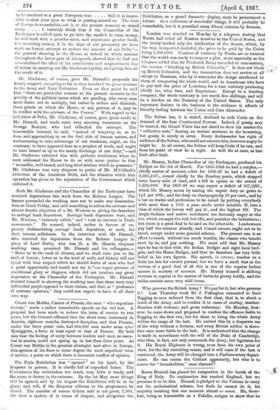Mr. Gladstone, of course, gave Mr. Disraeli's proposals his hearty
support, excepting so far as they involved the great increase in the Army and Navy Estimates. Even on that point he said that "there are particular reasons at the present moment in the gravity of the political issues which are pending, why every man must desire not to multiply, but rather to reduce and diminish, those points on which the House, or any portion of it, may be in conflict with the advisers of the Crown." With regard to the
--rth.4.40.n of Debt r Mr.- Gladstone, of course, gave great credit to Mr. Disraeli, and made some very amusing comments on Sir George Bowyer, who had ridiculed the attempt. The honourable baronet, he said, "instead of tempting us, as he does, and approaching us on the frail side of human nature, and endeavouring to take advantage of our weakness, ought, on the contrary, to have appeared here as a prophet of truth, and ought to have braced us up to the manly discharge of our duty,"—and Mr. Gladstone exhorted him with pathetic tenderness when he next addressed the House to do so with more justice to that "recondite, well stored, and long tried wisdom which he possesses." Mr. Gladstone was very eloquent in praise of Mr. MCulloch's reduction of the American Debt, and the stimulus which that operation has given to the reputation of the Government which enforced it.






























 Previous page
Previous page